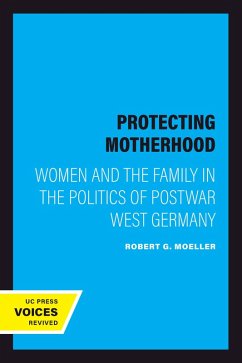Robert G. Moeller is the first historian of modern German women to use social policy as a lens to focus on society's conceptions of gender difference and "woman's place." He investigates the social, economic, and political status of women in West Germany after World War II to reveal how the West Germans, emerging from the rubble of the Third Reich, viewed a reconsideration of gender relations as an essential part of social reconstruction. The debate over "woman's place" in the fifties was part of West Germany's confrontation with the ideological legacy of National Socialism. At the same time, the presence of the Cold War influenced all debates about women and the family. In response to the "woman question," West Germans defined the boundaries not only between women and men, but also between East and West. Moeller's study shows that public policy is a crucial arena where women's needs, capacities, and possibilities are discussed, identified, defined, and reinforced. Nowhere more explicitly than in the first decade of West Germany's history did, in Joan Scott's words, "politics construct gender and gender construct politics." This title is part of UC Press's Voices Revived program, which commemorates University of California Press's mission to seek out and cultivate the brightest minds and give them voice, reach, and impact. Drawing on a backlist dating to 1893, Voices Revived makes high-quality, peer-reviewed scholarship accessible once again using print-on-demand technology. This title was originally published in 1993.
Dieser Download kann aus rechtlichen Gründen nur mit Rechnungsadresse in A, D ausgeliefert werden.









